Over a month has now passed since our first concert of George Allan and Thomas Bulch material. I thought it might be a good idea, now that some of the footage is finally emerging, to reflect on the process and the event itself.
The Idea
The group that we are, as well as the subject we are interested in, has two key aspects. There is the story, a fascinating piece of social history; and, there is the music. To understand George Allan and Thomas Bulch, we need to explore both. And to bring any value from doing so we need to share what we discover.
It was Steve Robson that suggested that we arrange an event at Ushaw College, which is a place to which he already has connections as the organiser of the Brass at Ushaw series of concerts, and also a venue he knows well enough to know that the facilities and environment would be well suited to such a project. His original thought was to have a workshop that might lead to a concert. This would have enabled a core single band, with added players from a number of bands to experience the music and, perhaps, report back to their bands if there were any pieces that they liked enough to suggest including in future programmes. To get the best results we’d need to enlist a top conductor. Immediately he suggested Richard Evans, a legendary and formidable conductor of marches. He would be able to lead This, then became the original plan.
Being a new group, and not yet established enough to secure any funding to further a project, it was clear that we would need to progress the event ‘on a shoestring’. The objective being to find out more about some of the work we’d not heard before. The deep polyphony of compositions for brass bands makes it very difficult for all but a very few to look at printed music and have much of an understanding of how it might sound. In addition we wanted to do something that would enable us to share what we discover with others, in a way that makes it more or less readily available for the future, such as a recording or film.
Though Richard Evans was reportedly delighted at the idea, and initially agreed, it soon became apparent that the logistics of including the concert, alongside other commitments he had, was prohibitive. So, under Steve’s guidance we changed course slightly and he ‘workshop’ became a ‘concert’. The Felling Band had contacted Steve already looking for an opportunity to perform a programme at Ushaw, so Steve took the opportunity to ask if they would be our first Wizard and Typhoon band.
The Programme
With a band and venue chosen, we needed to select some music to be performed. We already had quite a collection of George Allan, and Dave Reynolds had been acquiring a range of sets of Thomas Bulch work which, being out of copyright, could in part be acquired from the Australian national archive. A number of pieces were also recommended though by new friends in Australia, Bob Pattie and Chris Ducardus, who generously took time out to scan them and send them over. We quickly found we had more pieces than we could fit in a concert programme. Some shortlisting was required.
One evening, in early May, Steve, Kelly and Dave from the group got together over a few cuppas and took a look through what was now in the collection. It wasn’t as easy as you might think and ended up being a very late night.
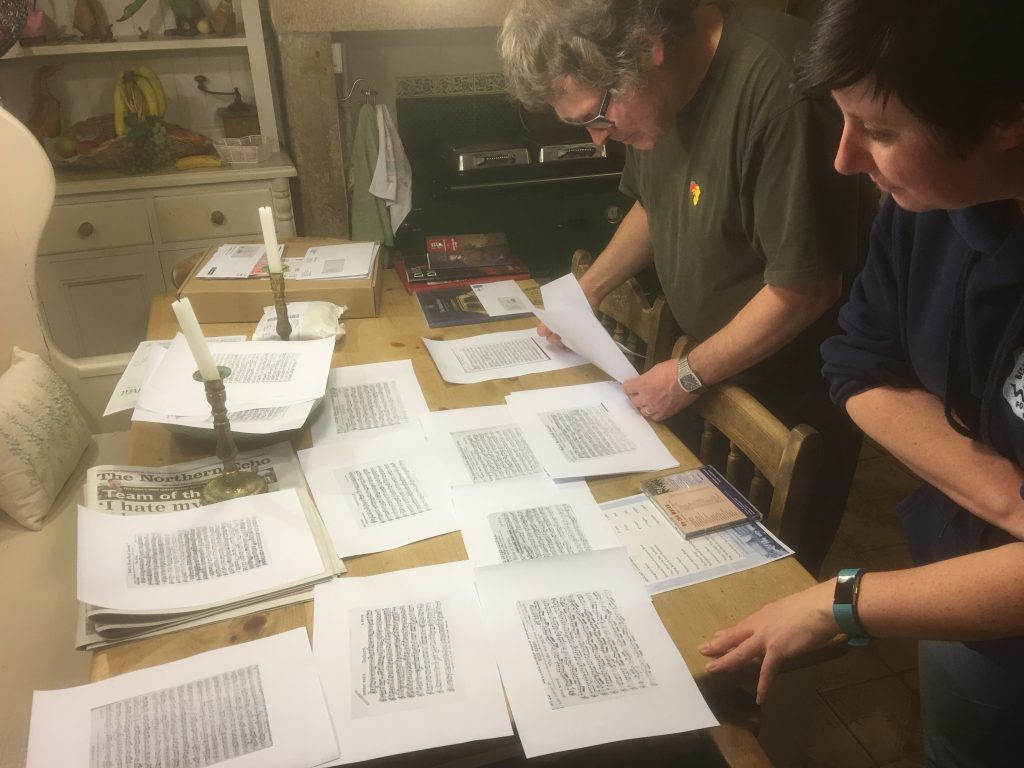
Steve was conscious that as a ‘concert’ we needed to make sure it would entertain, so we agreed to include a couple of time honoured George Allan favourites – ‘The Wizard’ of course and ‘Knight Templar’ – but then what? Through a gradual process of elimination a provisional set was agreed.
The Music
From there it was a case of getting the music together. By that point we’d learned from Brian Yates that ‘The Typhoon’, Thomas Bulch’s first published composition, may well have been found. With this in mind we had included it as a title within the programme – but would it turn up in time, if at all?
Steve set about creating a musical score for the conductor for some of the pieces; it would have been too challenging to do this for all in the time he had available. In ‘days of yore’ a conductor would have used a copy of the Solo Cornet piece in the absence of a full score, so this became our fallback for those where there would be no score available.
Many of the compositions that had been provided digitally needed a little work doing to them to clean up the sheets. Many of these were scanned from printed music over a hundred years old, much of which may have been needing careful handling and been a bit fragile. So this task was gradually worked through.
As we did so, ‘The Typhoon’ arrived, meaning that we could include the two parts that give us the name of our group, which was brilliant news. It all seemed to be coming together.
Kelly took the responsibility for bringing all the pieces together in the correct sequence in a set of folders bought for the event. Sounds easy? We exhausted one printer cartridge after another printing out the music, but when we’d finally managed to get everything ordered and bound it felt like a real milestone.
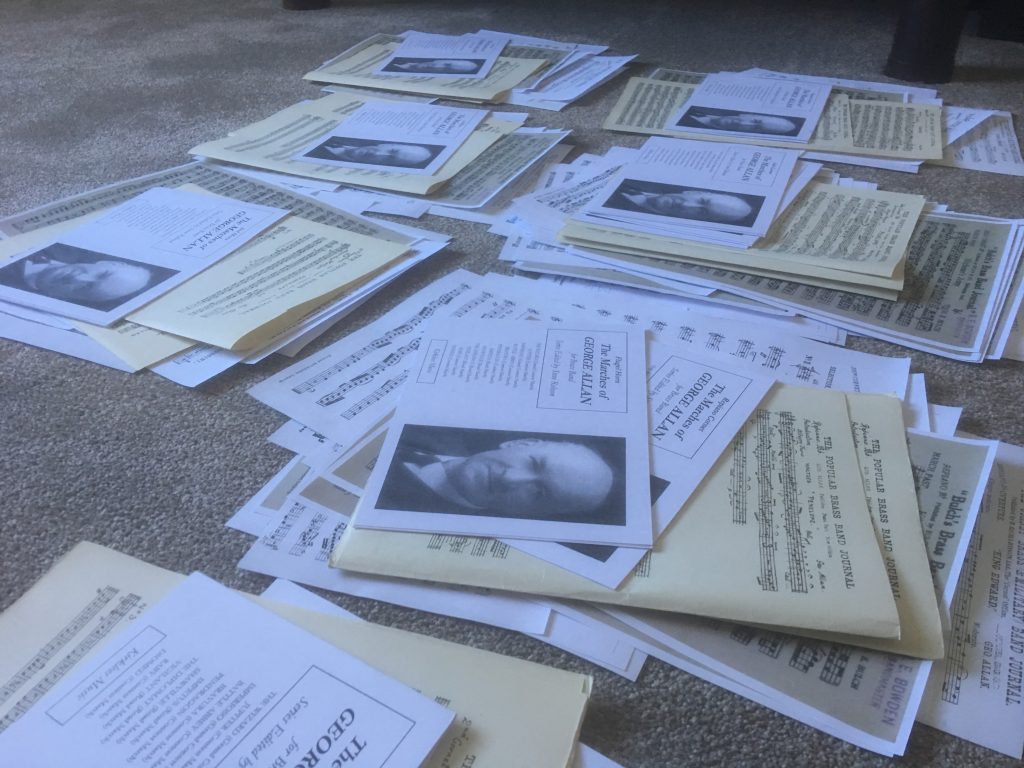
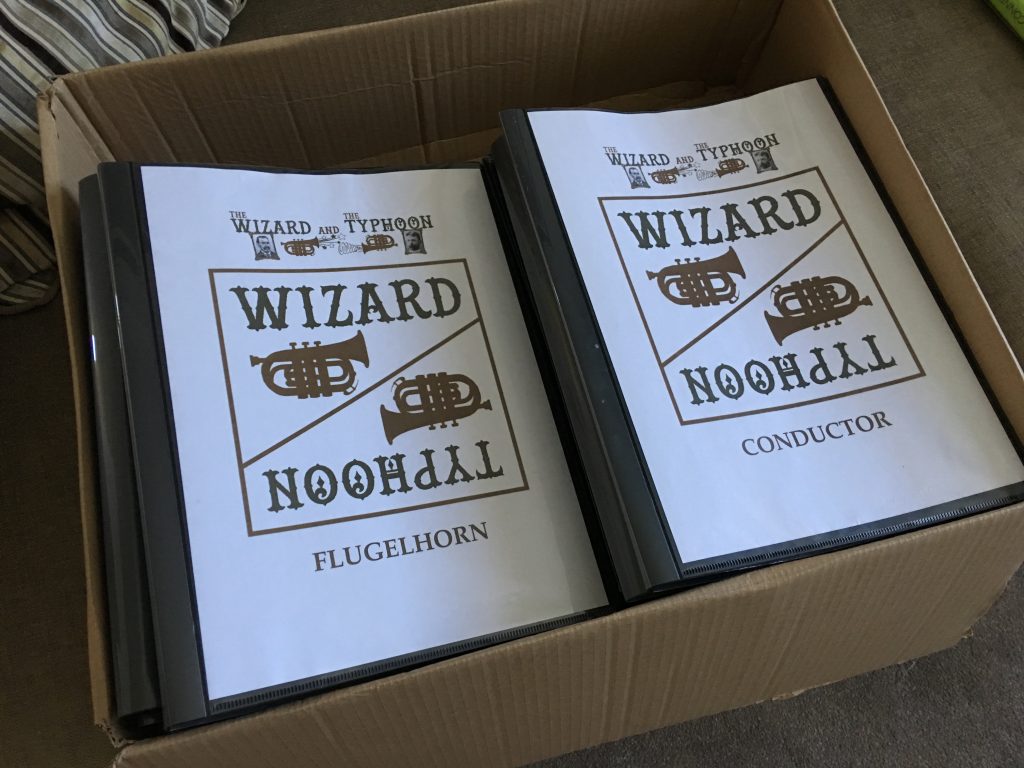
Publicising
A concert with no audience is no thing of great beauty, so along the way we’d set about trying to generate as much interest in the concert as we could. Dave started with an image of the Felling Band that they had provided, and before long had come up with a styling that was applied to digital publicity items, flyers and posters. A press release was issued and we set out to create as much noise as we could in the media; or to be more honest, as much noise as we had time to make. 4barsrest, the Shildon Town Crier and the Northern Echo among others really came to our aid. The latter of these bestowed upon us the rare honour of a full page article and front page mention, which was utterly magnificent, whilst the others published fantastic articles for us. We are grateful to all of these. Posters were distributed, and flyers issued over brief explanatory conversations at the Durham Miner’s Gala, Big Brass Bash in Shildon and at a band contest at Houghall among other opportunities. Even if people didn’t come along they would know about whet we were doing. In addition to this social media platforms were liberally scattered with our promotions.
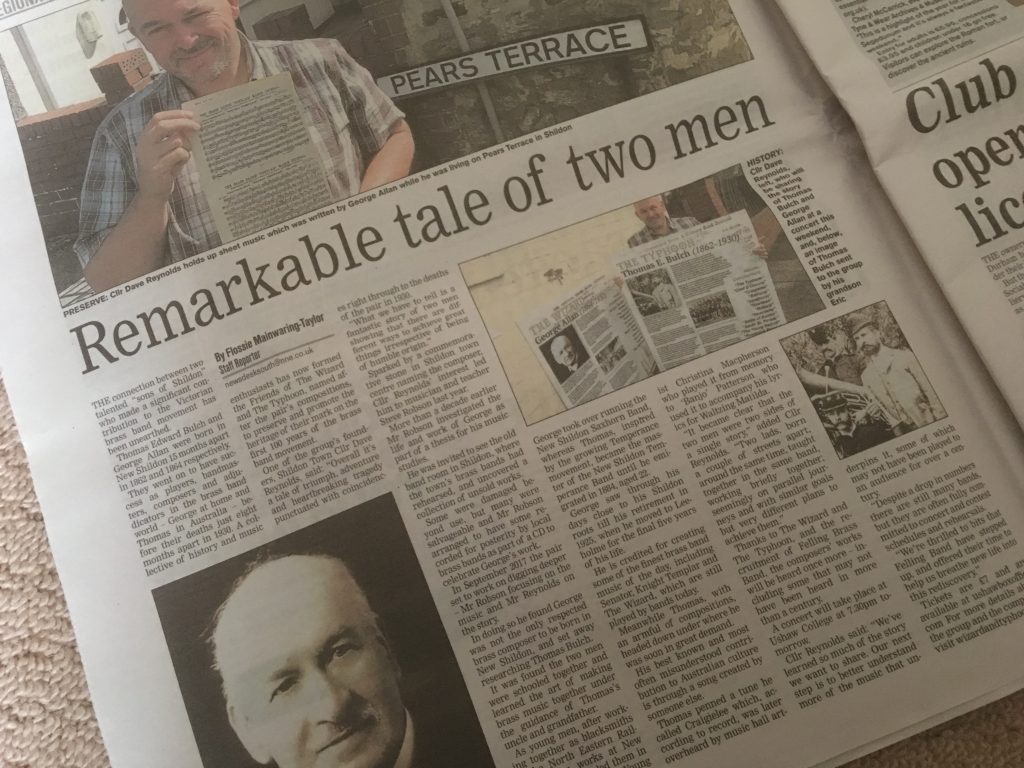
The Build Up
Gradually the day was approaching. Steve had been hoping that he might be able to join with the band and play at the concert, but it became apparent that the event would need a compere, and as a man of considerable charm and charisma (not to mention knowledge of the subject) he would be the best choice, so duly conceded his seat on the stage.
In the meantime, Dave had made an arrangement with a friend Graham Kay to record and film the event using his outside broadcast and recording truck. As we were doing this on a shoestring we’d have to make do with what cameras we had between us rather than hire in the kit to suit the job, but nonetheless it was still going to mean that we’d have a record of the music that we, and others, could refer to as often as we needed. Dave and Graham visited Ushaw in advance to do a survey of the building and plan a rudimentary shoot.
In the meantime dave has also been working on a programme to accompany the event; and, keen that people should have the opportunity to familiarise themselves with George Allan’s already know works, Steve arranged for a re-run of a George Allan CD that he had helped arrange when he had previously looked into the music of George Allan before he knew anything about Thomas Bulch. The re-pressed CDs arrived just in the nick of time, as did a box of concert programmes Dave had designed and ordered.
All throughout this most of us had no idea how things were progressing with regard to rehearsal of the music. We hadn’t been able to attend rehearsals to see or hear any of the music being played. This left us, probably somewhat unnecessarily anxious about the concert and how well it would go. But it also added to the excitement for it when we’d finally get to hear some of this music we’d been so lucky to get our hands on.
On The Day Itself
For some time we’d been planning to spend much of the day setting up to make sure everything was ‘just so’, but we found out just before the day that the theatre had been booked for a piano recital, so would be inaccessible to set up until late afternoon. We adjusted our plans accordingly. The morning and early afternoon was spent gathering additional equipment we’d need, such as some additional lighting, which the very night before had been used to illuminate a choir in Durham Cathedral. Prior to the piano recital we’d managed to set up a display of boards that Dave designed and ordered from a printer, to which we’d later add some original George Allan sheet music and some antique musical instruments provided by Brian Yates.
After the piano recital was over there was a great deal to do. Firstly we had to get the truck, with the recording and video mixing equipment, through a narrow gateway and into place outside the rear of the theatre. Then there was a lot of technical set up, cabling, setting up microphones and cameras, testing digital feeds etc. The lighting was to rig up. We just managed in the very nick of time, and in doing so a couple of simple mistakes were made, though none of which would fatally undermine the objective. As the band were getting ready and audience entering the venue, we were more or less ready to go. Phew!
The Concert
As the theatre began to hush the band, and conductor, took their place on the stage, with Steve Robson directing as compere. It had been a hot day and the band had dispensed with their usual turquoise formal uniform jackets for the event, which must have made things more comfortable for them.
The opening number was “The Wizard”, a number which George Allan himself once described as ‘splendid, grand effects’ which it certainly has, making it an evergreen popular contest march even in the modern era. The band settled into the march and rendered it admirably.
From there we ventured into unknown territory, with a Bulch arrangement of Rossini’s “The Barber of Seville” entitled “Il Barbiere” which again contained much familiarity making it easy to enjoy. It was well played, the band staring to sound, and possibly feel, more comfortable. I’m not sure but it can’t be that comfortable an experience under lights knowing that the cameras are rolling, so they had my sympathy for that. If they had been nervous about it though they were doing a good job now of not showing it.
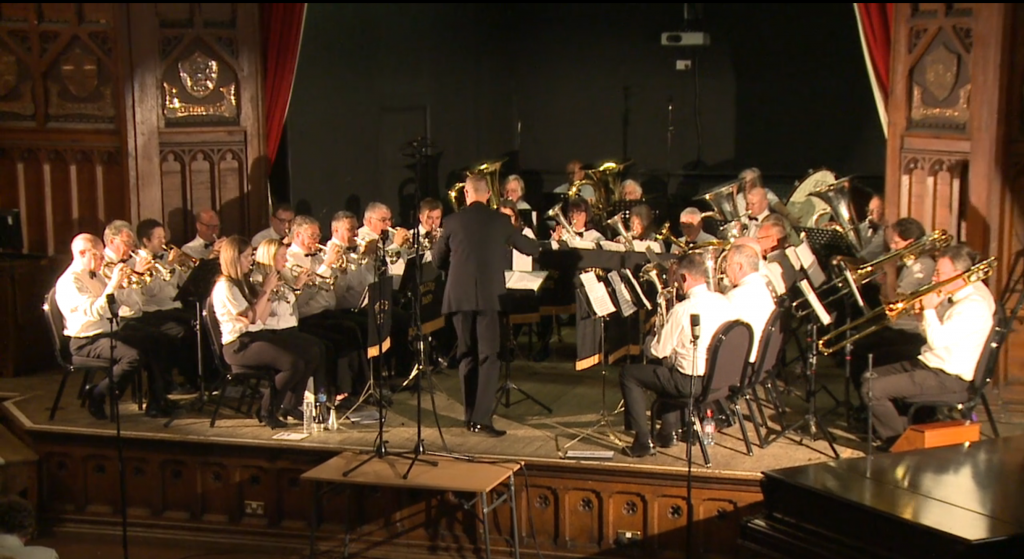
We then included “Sons Of Toil”, a George Allan march that I had asked to be included as it brought to mind to me the idea of his being influences by the Durham Miner’s Gala. This was followed by Bulch’s (or rather Godfrey Parker’s) Craigielee, which hardly anyone would have heard in Britain, yet most would find it immediately recognisable on account of it having been the basis of the music to which the song “Waltzing Matilda” was sung. This was an excellent and enjoyable rendition.
Allan’s “Impetus” came next, having been discovered by Steve in the former bandroom attic at Shildon on a visit there almost 20 years ago. Next, the Felling solo cornetist, Elizabeth, gave a demonstration of her triple tonguing skills through the tricky little Bulch piece “The Tripod”, the closest thing we had in our collection to a solo piece. “Imperioso” by Allan was the piece that ended the first set.
Set 2 commenced with “The Typhoon”, Tom Bulch’s first published march, which we estimate to be from around 1880 which would have been before his emigration to Australia. We have the Stamford Band to thank for preserving that. Then came a lovely overture by Bulch entitled “Memories of England” and a rousing march past “Kitchener’s Army” with a good few familiar tunes in the arrangement that went down well. We had included this as a nod to the centenary of the end of the Great War, in which both of Tom Bulch’s sons had served, and in which his eldest Thomas Edward Bulch Jnr. had tragically lost his life in France in 1916.
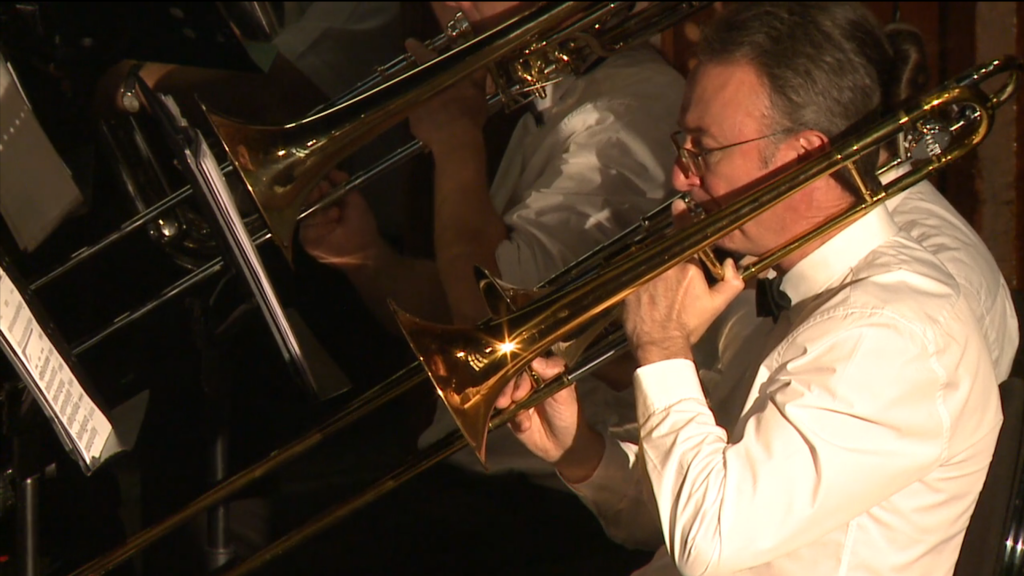
“Penelope” a set of waltzes by George Allan came next. Allan doesn’t seem to have created many waltzes, preferring the march format, so we were keen to hear what one of his waltzes would sound like. This was followed by Bulch’s “Sandhurst” which we had heard a recording of previously, and “King Edward”, an overture by Allan to commemorate the coronation of Edward VII in 1902. This piece caught out imagination as we’d seen photographs taken of Shildon decked out in patriotic regalia to celebrate that event and could just imagine George’s band playing this piece. The piece includes the National Anthem at the end, for which the audience spontaneously stood.
To end, a fantastic rendition of the still popular Allan march “Knight Templar” which is still played by bands around the world, and really shows up the best of all sections of a band.
Throughout this Steve entertained and informed with tales, and anecdotes, and explanations like a perfect host. The overall performance, ending in ovations for the band, had been fantastic. We were both thrilled and relieved. Yes, it’s fair to say that we had a few vacant seats throughout which we’d have liked to have seen filled, but for an initial concert it had gone really well. We, and the band, could start to relax at last. The conductor, Andy Hunter, did a magnificent job and each and every member of the band did us proud.
We’d like to extend our thanks to everyone who supported us in the build-up to the concert, and all those who attended. Naturally, the band and conductor too, we’d not have been able to do anything without their willingness to participate by playing the music. We hope it was somewhere near as enjoyable for them to play as it was for us to hear it.
Whatever will we do next?
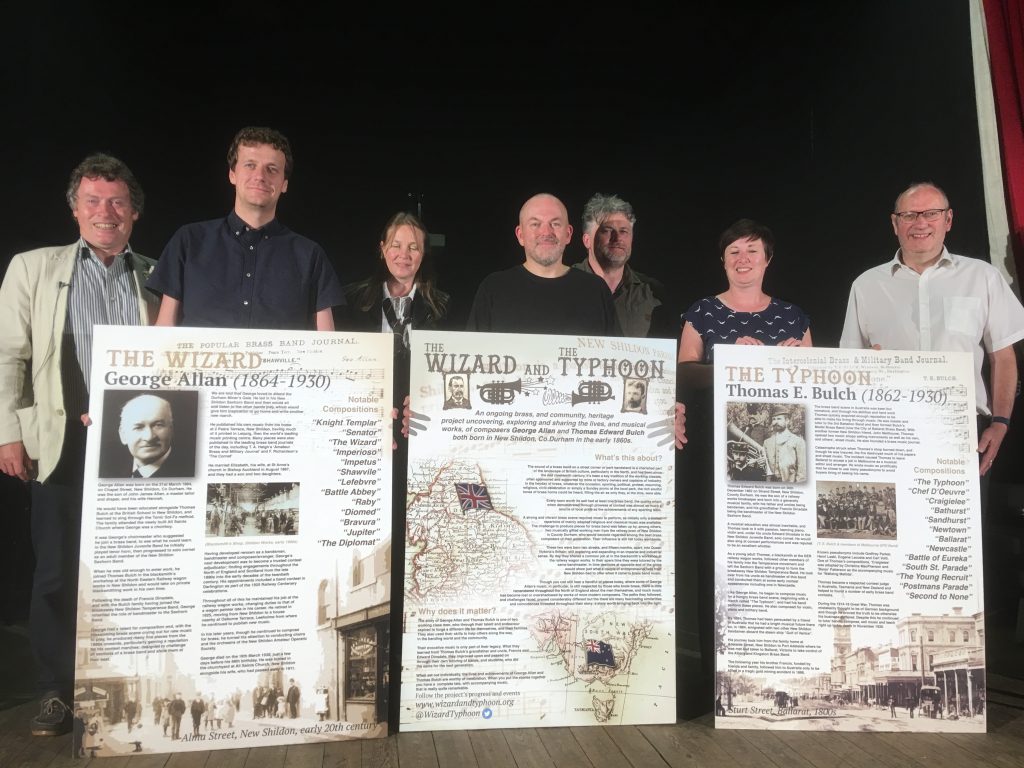
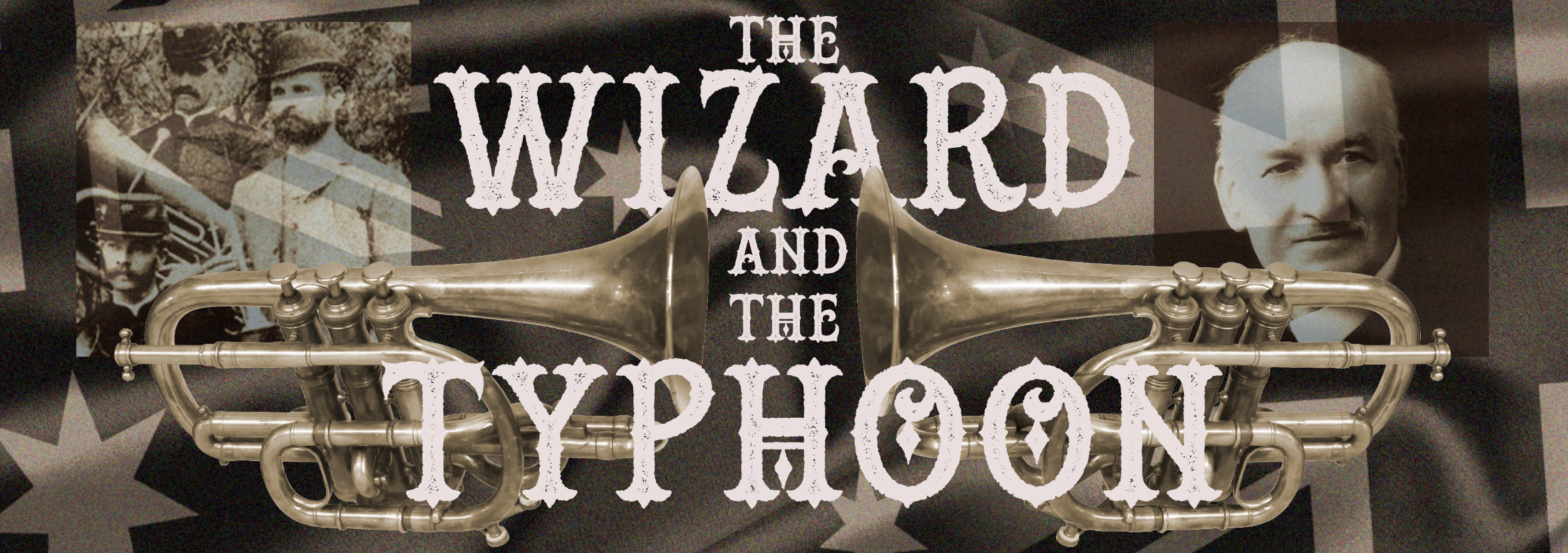
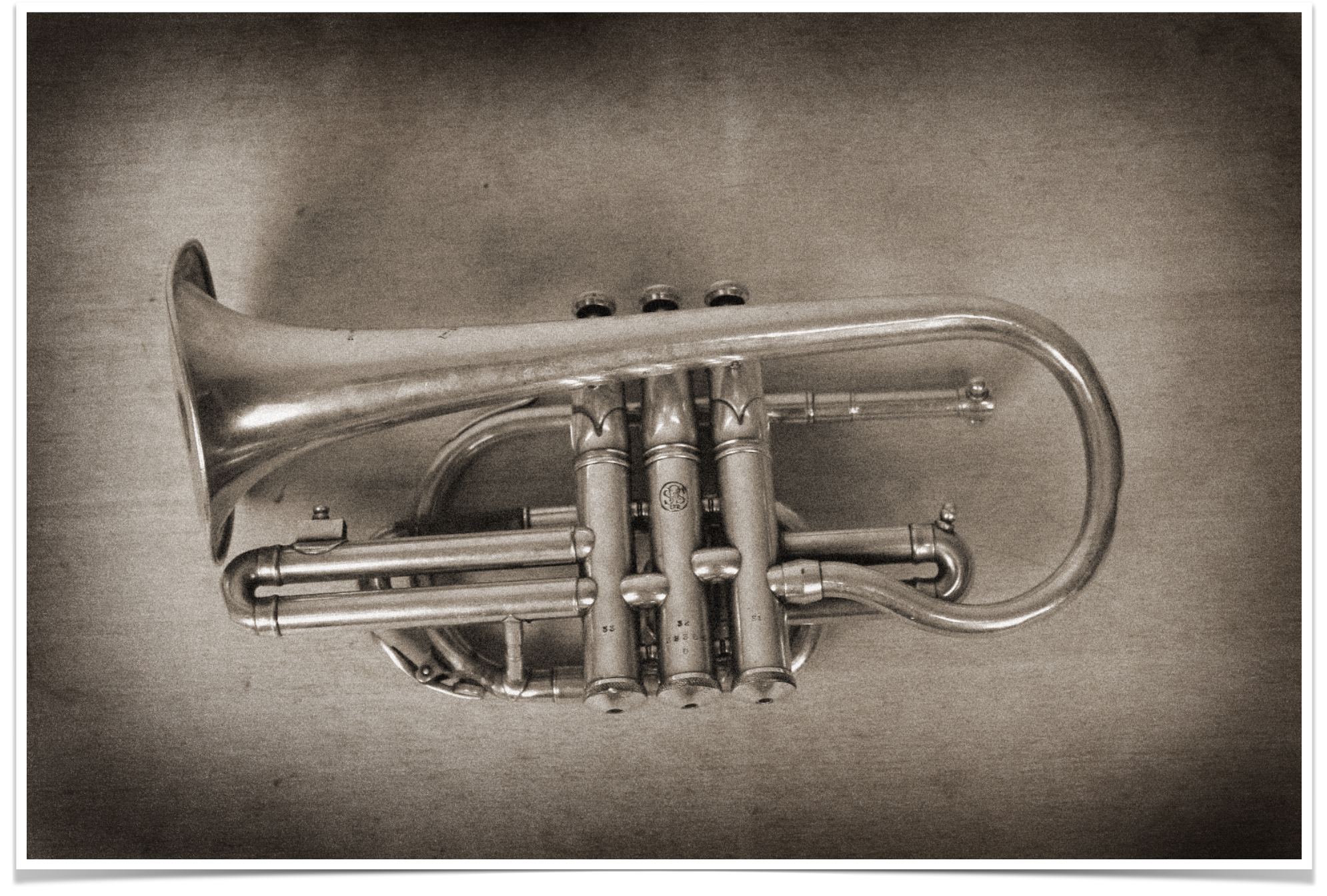
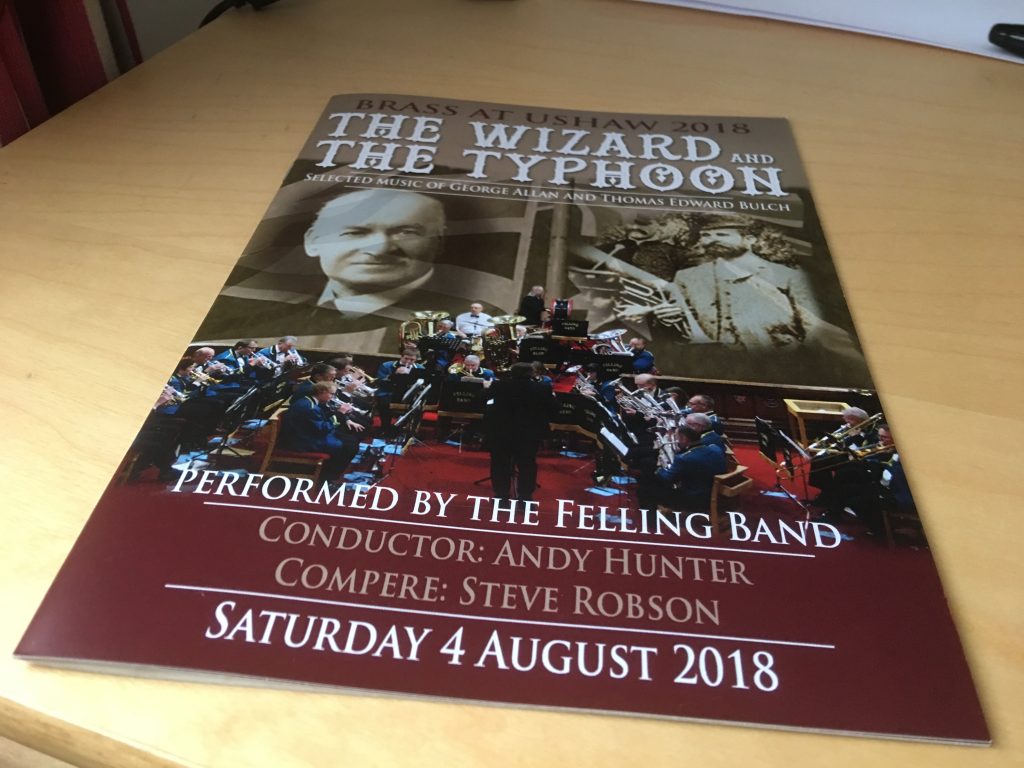
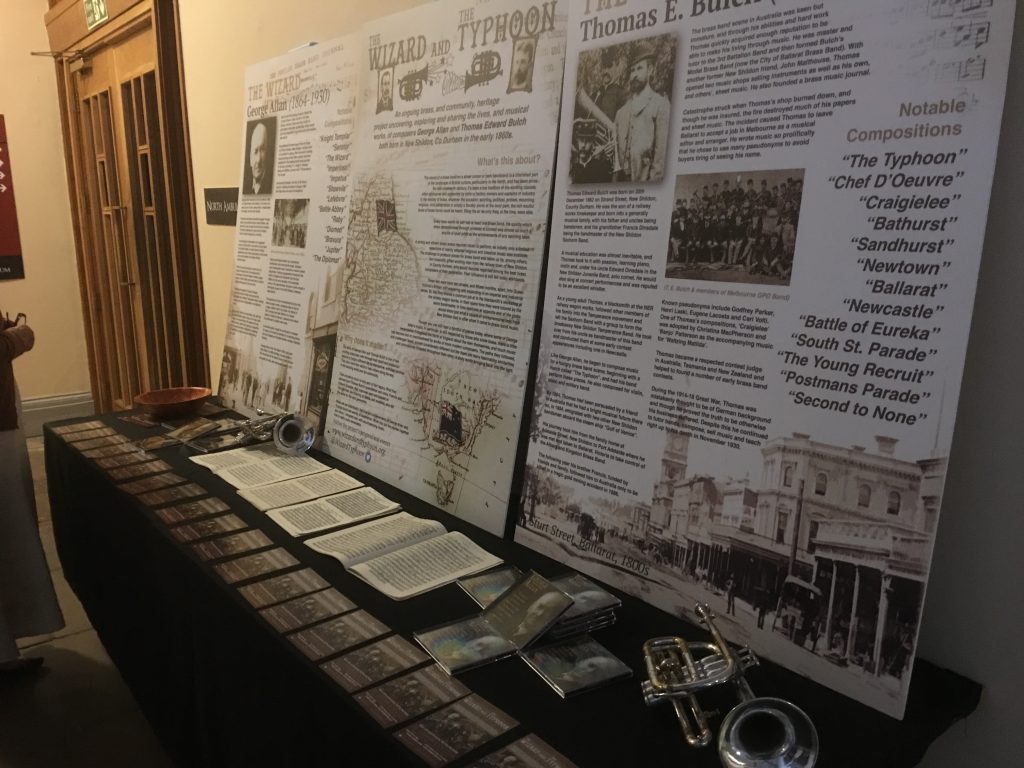
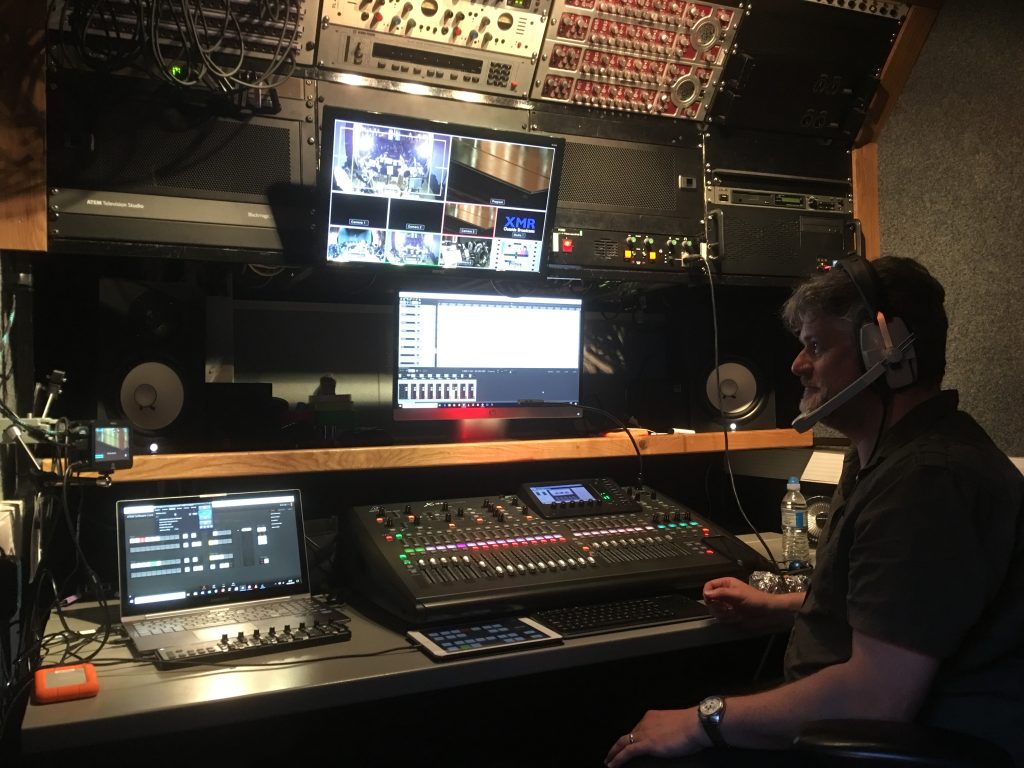
Congrats Dave. Have enjoyed following this from afar in oz. Thomas Bulch was my GG grandfather & his eldest son Thomas mentioned in this article was my G Grandfather.